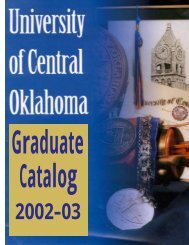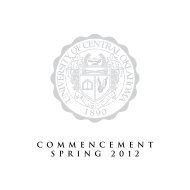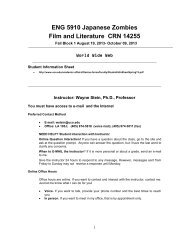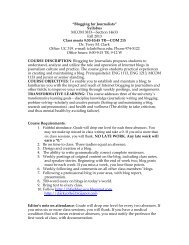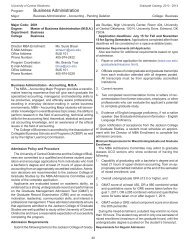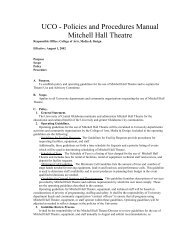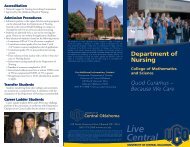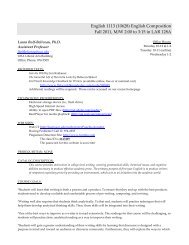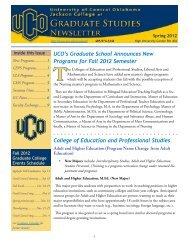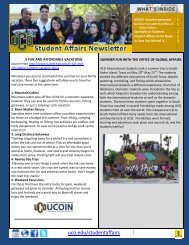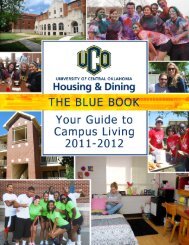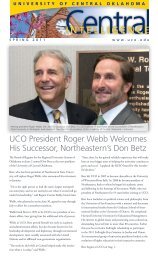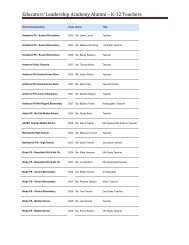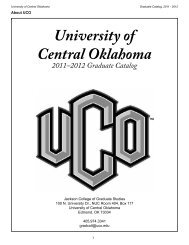Graduate Catalog - University of Central Oklahoma
Graduate Catalog - University of Central Oklahoma
Graduate Catalog - University of Central Oklahoma
Create successful ePaper yourself
Turn your PDF publications into a flip-book with our unique Google optimized e-Paper software.
<strong>University</strong> <strong>of</strong> <strong>Central</strong> <strong>Oklahoma</strong><br />
<strong>Graduate</strong> <strong>Catalog</strong>, 2012 - 2013<br />
<strong>Graduate</strong> Course Descriptions<br />
MATH 5940 - Field Study In Mathematics<br />
Credit will vary from 1 to 9 hours. Subject matter will vary within the<br />
department’s field <strong>of</strong> study.<br />
MATH 5950 - Internship In Mathematics<br />
Credit would vary from 1 to 8 hours. Subject matter would vary within<br />
the department’s field <strong>of</strong> study. Supervised practical experience<br />
gained in a pr<strong>of</strong>essional field by an advanced or graduate student.<br />
MATH 5960 - Institute In Mathematics<br />
Credit will vary from 1 to 8 hours. Subject matter will vary within the<br />
department’s field <strong>of</strong> study.<br />
MATH 5970 - Study Tour<br />
Credit will vary. Subject matter will vary within the department’s field<br />
<strong>of</strong> study.<br />
MATH 5980 - <strong>Graduate</strong> Project<br />
A contemporary problem provided by business and industry and selected<br />
with consideration <strong>of</strong> the interests and abilities <strong>of</strong> the individual<br />
student. Prerequisite(s): Written permission <strong>of</strong> instructor and MATH<br />
5853. Enrollment open to Math majors only.<br />
MATH 5990 - Thesis<br />
Credit will vary from 1 to 6 hours. Subject matter will vary within the<br />
department’s field <strong>of</strong> study. Prerequisite(s): Permission <strong>of</strong> instructor<br />
and MATH 5853. Enrollment open to math majors only.<br />
MASS COMMUNICATION (MCOM)<br />
Department <strong>of</strong> Mass Communication<br />
MCOM 5000 - Workshop in Mass Communication<br />
Credit will vary from 1 to 4 hours. Subject matter will vary within the<br />
department’s field <strong>of</strong> study. Normally involves lecture, films, guest<br />
speaker, etc. A grade <strong>of</strong> “P” or “F” is given. No more than 2 hours <strong>of</strong><br />
workshop may be counted on a master’s degree.<br />
MCOM 5013 - Introduction to <strong>Graduate</strong> Studies<br />
Introduction to <strong>Graduate</strong> Studies outlines the development <strong>of</strong> research<br />
and pr<strong>of</strong>essional development in communication. This course<br />
provides an integrative conception <strong>of</strong> the human communication<br />
discipline as well as an introduction to research, methodologies, and<br />
theory formulation and application. Students incorporate research<br />
skills that are vital to success in graduate training in communication.<br />
Prerequisite(s): Bachelor’s degree.<br />
MCOM 5023 - Interpersonal Communication<br />
Interpersonal Communication focuses on the messages and meanings<br />
created among people through human interaction. Messages can be<br />
verbal and/or nonverbal in nature. This graduate course provides an<br />
intensive examination <strong>of</strong> theories, methods <strong>of</strong> investigation, and current<br />
developments in the area <strong>of</strong> interpersonal communication. This<br />
survey course covers a broad range <strong>of</strong> topics studies by scholars<br />
interested in interpersonal communication. The primary focus <strong>of</strong> the<br />
course is the relational communication process and messages people<br />
use to define interpersonal relationships (e.g., dominance- submissiveness,<br />
affection, involvement and similarity in close relationships).<br />
MCOM 5033 - Intercultural Communication<br />
Intercultural Communication provides a comprehensive survey <strong>of</strong><br />
the field <strong>of</strong> intercultural communication. Students study the broad<br />
and diverse conceptual domain <strong>of</strong> the field and its key subdomains,<br />
core issues, and key concepts. Recent theoretical and research developments<br />
are examined, as well as special methodological issues<br />
in conducting research involving individuals <strong>of</strong> differing cultural or<br />
subcultural backgrounds.<br />
MCOM 5413 - Techniques Of Forensic Photography<br />
This course explores the techniques used in obtaining and producing<br />
photographs used in investigation, evidence gathering and general<br />
photography used by law enforcement agencies. This course is<br />
designed for students planning to pursue a career in the forensic<br />
sciences. Prerequisite(s): MCOM 1123.<br />
MCOM 5623 - Gays & Lesbians in Film/Media<br />
This course examines representations <strong>of</strong> gays and lesbians from the<br />
development <strong>of</strong> an alternative gay and lesbian cinema movement to<br />
the mainstreaming <strong>of</strong> gay and lesbian people in television and in film.<br />
MCOM 5633 - Race, Violence, Youth, & Media<br />
Race, Violence, Youth and the Media will critically examine various<br />
mass media representations and coding <strong>of</strong> contemporary youth<br />
subcultural formations in the U.S.A.<br />
MCOM 5733 - Communication & Religion<br />
This course <strong>of</strong>fers a view <strong>of</strong> religion solely from a communication perpective.<br />
Communication is, in essence, message-centered behavior.<br />
Therefore, course content <strong>of</strong> the Communication and Religion course<br />
examines the communication in a variety <strong>of</strong> contexts associated with<br />
the dissemination <strong>of</strong> religion- based human messages: face to face,<br />
one to many, in print, as well as in mediated venues. Interpersonal<br />
communication theory is at the center <strong>of</strong> religious communication<br />
(e.g., theories clearly not addressed in humanities, philosophy, or<br />
sociology). Students in this upper division course think critically<br />
and synthesize theoretical information through analysis <strong>of</strong> religious<br />
communication.<br />
MCOM 5743 - Couples Communication<br />
Couples Communication brings about an understanding <strong>of</strong> the role<br />
<strong>of</strong> memory, communication, and social cognition in the development<br />
<strong>of</strong> romantic relationships. The course presents a cognitive approach<br />
to the development <strong>of</strong> romantic relationships and addresses many <strong>of</strong><br />
the criticisms leveled against stage models by emphasizing the role<br />
<strong>of</strong> cognitive expectations about how relationships develop.<br />
MCOM 5753 - Intergenerational Communication<br />
Intergenerational Communication focuses on the role <strong>of</strong> communication<br />
in intergenerational interactions within various contexts (interpersonal,<br />
familial, health, mediated technologies, and workplace).<br />
Students design and conduct original research that builds upon<br />
current and emerging findings on intergenerational communication<br />
phenomena.<br />
MCOM 5763 - Communication & Reality TV<br />
Communication and Reality TV is a study <strong>of</strong> interpersonal communication<br />
theory as exhibited in reality television. Reality television<br />
<strong>of</strong>fers a unique arena in which to study and analyze interpersonal<br />
relationships. Reality television shows cast relatively diverse groups<br />
with the intention <strong>of</strong> observing and documenting the resulting conflict<br />
or harmony.<br />
MCOM 5773 - Dark Side <strong>of</strong> Relationships<br />
The Dark Side <strong>of</strong> Relationships is a study <strong>of</strong> how individuals deal with<br />
the darker sides <strong>of</strong> interpersonal communication and close relationships.<br />
Topics will include but not be limited to: messages that hurt,<br />
fatal attraction, losing, leaving and letting go, relational transgressions,<br />
deception, jealousy and envy, and social predicaments. Students<br />
will be exposed to current research and topical trends in this area.<br />
Students will engage in the process <strong>of</strong> exploring interpersonal theory<br />
and research. Students will be given the opportunity to think, to evaluate,<br />
and to discuss aspects and concepts from current research.<br />
239



